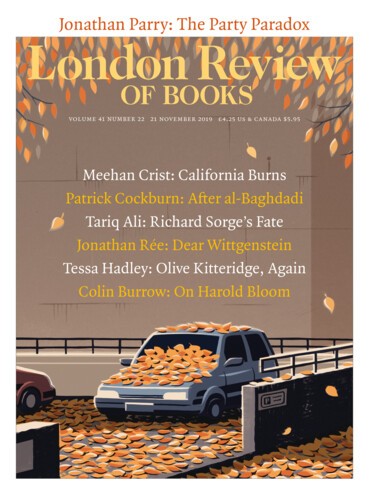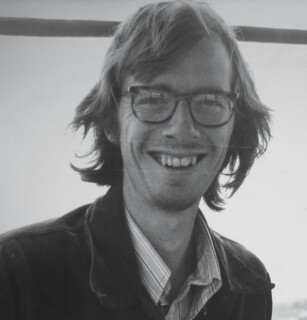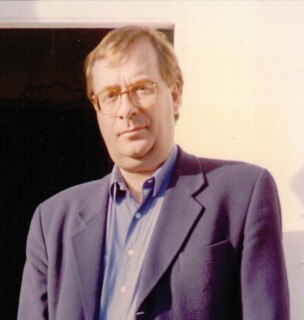Michael Neve died on 9 October. I first met him in 1995, at a funeral. We had been taught Nietzsche by the same lecturer at Cambridge; that had been enough academia for me, but Michael had advanced (or, by his own account, stumbled haplessly) to the position of senior lecturer at the Wellcome Trust Centre for the History of Medicine at UCL. He had a contract with Penguin for an anthology of Fin-de-Siècle writings, on which he insisted I join him as coeditor. Before long I was a regular visitor to his office on the fifth floor of the Wellcome Building on Euston Road.
Michael’s office housed a fine library and an oak and leather desk that had once belonged to Dr Barnardo, but it mostly seemed to function as a social space for his postgraduate students. It would be wrong to say that he held court – he was far too democratic for that, insisting on addressing everyone as ‘doctor’ whether or not they held any qualifications – but the door was always open, with conversation and laughter spilling out. The contrast with the office next door, Roy Porter’s, was total. Roy’s was a one-man publishing house, staffed by well-drilled research assistants, from which flowed an incessant stream of books, papers, essays and reviews. Michael’s ‘big book’ had been commissioned by Penguin more than a decade previously, to be based on his lecture course on late 19th-century views of evolution and degeneration. It had the perfect title, Evening’s Empire (from ‘Mr Tambourine Man’), and was listed on Amazon complete with page count, but it was unclear whether he’d actually started writing it. Once a year, at the TLS summer party, he bumped into his editor who asked diffidently: ‘Ah, Michael! Will it be … soon?’ ‘Soon – yes, soon,’ Michael replied reassuringly. This went on for 16 years before he was asked to return the advance.
By the time I met Michael he was often described as Falstaffian, legendary for his prodigious appetites and multiple chins and for never actually accomplishing anything (of course, he talked brilliantly about Falstaff). But in his youth, I learned, his nickname had been ‘the Thin Man’ – he still had a wooden stash box on which his friends had had these words inlaid while on the hippy trail in Kashmir – and he had been a whirlwind of ideas who was always talking on Radio 4 or dashing off a piece for the LRB.
He became a member of the LRB’s editorial board in 1983. When I knew him he dismissed this as a relic of a past life occasionally glimpsed in anecdotes of drinking with Martin Amis and Christopher Hitchens, or lunching with Mick Jagger. He maintained he had done nothing to earn his credit for years, and as a result it took me a long time to recognise how considerable his contribution had been. The range of his two dozen pieces from the 1980s is staggering: from poetry to sex to science, politics to pop culture to psychoanalysis (a lot of psychoanalysis). But what strikes me most is their confidence, the originality and ambition of his arguments. ‘How do minds close? Under what series of angers, of single visions, does the deliberate deafness take hold?’ is the way a piece began that yoked together Timothy Leary, anti-Freud polemic and Andrea Dworkin. ‘Oliver Sacks is the Jules Verne of the neurological interface’ was the opening of another piece. Just as often, the most startling insights appeared as throwaways. ‘It’s a moot point as to whether one should recommend books about madness’ is an aside in a review of Roy Porter’s Faber anthology on the subject, but it lodges in the mind as deeply as anything in the book itself.
Once the argument was framed, the works under review were often dealt with swiftly and sharply: ‘an honest piece of work, a little bit underpowered, but with a thesis’; ‘this biography does useful service, but not much more.’ His self-assessments could be equally brusque: ‘I exaggerate a little, but not outrageously’ – this in an essay entitled ‘Is Michael Neve paranoid?’, a question that answers itself, though the piece answers a different question, about the history of the diagnosis. There’s more autobiography in a review of new works on Hamlet. It begins:
Delay, the reasons for delay, the question as to what kind of behaviour is going on in the business – indeed, the industry – of delaying, is worth some time. For one kind of modern mind, there’s no problem: delay is simply the tedious exterior of the lazy sod, the sod beneath the skin … This seems an increasingly unattractive line to take, usually emanating from people unable to grasp that some kinds of ‘work’ are pathological, and that a life that cannot work at a number of things besides ‘work’ is not always a good life.
There’s an intimidating quality to these pieces that was, if not absent, considerably muted in the Michael I met. At the beginning eminent authorities are cut briskly down to size, entire schools of thought undermined with a few contrary facts, the book under review impatiently rewritten. The performance can be just as unsparing for the reader. Even when he’s writing on subjects I’m supposed to know about, his references expose my ignorance and his arguments sometimes go over my head. The Michael I knew was less peremptory: perhaps more at peace with his inner Hamlet, perhaps more thoroughly immobilised by him. I’m struck by his verdict on Timothy Leary and the way his lysergically opened mind closed down to a cheesy vision of humanity’s future in outer space that left Leary ‘at the mercy of this empty epic, hopelessly confident in the expanding future, travelling around with his unconvincing smile’. ‘It is salutary,’ Michael writes, ‘to reflect how comparatively rare is the expression “I don’t know.”’
Yet it wouldn’t be right to say that his youthful confidence was replaced by agnosticism. The two coexisted: he was extravagantly opinionated, but also prone to retreat into apology and self-doubt. His character was a tapestry of such contradictions. He was painfully honest about himself and notoriously indiscreet about others, yet at the same time, in the word he used of himself, ‘dissembling’: one could have a conversation of deep sincerity and only realise later that he hadn’t quite said what he actually thought or meant. He could be staggeringly self-indulgent, and also self-sacrificing to a fault. His scholarship was breathtaking but so was his capacity for exaggeration and bullshit. He regarded himself as a weakling and I never saw him do a stroke of physical work, but he clearly had the constitution of an ox. And so on – yet it’s hard to think of anyone who was more authentically or unapologetically themselves.
Hanging out at the Wellcome was always a pleasure, but the real deal was lunch. By noon Michael had one eye on the clock and the other on grabbing an agreeable table somewhere in Soho. Lunch was partly a social occasion, partly a graceful segue into drinking time, partly the continuation of work in a different key. We did most of our productive collaboration over lunch, and I only realised with hindsight just how much expert tuition was being dispensed along with the Picpoul and Pomerol. (And he always insisted on picking up the tab.) It was a masterclass in scholarly ju-jitsu, teaching without appearing to do so. A few modest questions, with profuse apologies for their ignorance, would expand the germ of an idea into a research project, an article into a book. The delicacy of his teaching methods made them invisible to many of his colleagues, for whom teaching was a chore and publication the path to career advancement. Michael’s conspicuous failure to publish was a standing joke, but less conspicuously he won prestigious awards for his teaching. Every year, keen medical students who had taken his course on Madness and Society to show a bit of range were lured across to a less certain but more passionately felt career in history and the humanities.
There are still basic questions I never managed to figure out. When, for example, did he read? He slept poorly, woke very early and arrived at the office before anyone else; there was a discreet, sober morning shift in which teaching admin happened, and some reading too. But he appeared to have read everything, not just across his academic fields – which spanned the history of madness from classical Greece to antipsychiatry, and 19th-century medical culture from French novels to Prussian sexologists – but the entire Western canon. In an academic world where most lean heavily on secondary sources and theory, he had read everything in the original. Had he done nothing but read in the decades before I met him? Or was he quietly industrious in the hours before dawn, while the rest of us slept?
Coleridge, one of his great favourites, described himself as a ‘library cormorant’; Michael was one too, in his mysterious way. ‘Coleridgean’ was an adjective he often applied to himself, by which he meant gloomy, self-pitying, procrastinating, a squanderer of promise. As he often said, he would have loved above anything to have heard Coleridge talk, and his own table talk had a magical superfluity: he talked away more books than most authors write in a lifetime. (Most of my books are ones he ought to have written.) I imagine the young Michael I never met, the Thin Man, somewhat like the young Coleridge in unstoppable verbal flow as he tramped the Lakeland fells – a spectacle that those who met the poet in middle age, histrionic and bedridden at Dr Gillman’s house in Highgate, found impossible to imagine. About ten years ago I discovered that Greta Hall, Robert Southey’s house in Keswick, was available for holiday lets, and that one of the bedrooms still had the four-poster in which Coleridge had slept. I booked it and drove Michael up there. He knew the Lakes much better than I did, having walked them in his youth. His knees were packing in, and it was years since he’d walked further than Euston to Soho (and he usually did that journey by taxi). But he led us on an exhilarating circuit of Windermere, talking all the way.
Send Letters To:
The Editor
London Review of Books,
28 Little Russell Street
London, WC1A 2HN
letters@lrb.co.uk
Please include name, address, and a telephone number.



